PPP -- The Traditional ORCC REMNANTS
Our Great-Grand-Father-in-Christ
Archbishop Arnold Harris Mathew, DD
Tragically, Utrecht, Holland is no longer Old Roman Catholic but simply Old Catholic. Therefore, the ancient and glorious Church of St. Willibrord and St. Boniface has its continuation and perpetuation through the present Traditional Old Roman Catholic Church comprised of several jurisdictions, which is compelled, in defense of its orthodoxy, to refuse to hold union with either Utrecht or the Old Catholics, or with their Modernist counterparts.
Before the great and ancient See of Utrecht abandoned her historic positions, Almighty God, in His Divine Providence, provided for the continuation of Old Roman Catholicism. Though Utrecht was to eventually abandon traditional Old Roman Catholicism, the Ultrajectine Tradition Catholic Church was not to perish...
The ORCC remained part of the Utrecht Union until December 29, 1910 when Archbishop Arnold Harris Mathew of Ireland and Great Britain (Portrait ABOVE) issued the "Declaration of Autonomy and Independence.” (This is the quintessential document BELOW which elaborates on the reasons for our secession.) He then severed ties with the Utrecht Union because of differences of beliefs and ecclesial praxis with the continental Old Catholic bodies and reestablished the traditional ORC Ultrajectine Tradition as the remnant of its former theological identity.
On April 28, 1908, Archbishop Arnold Harris Mathew of England was consecrated to the Episcopacy by Archbishop Gerard Gul of Utrecht, assisted by Bishops N.B.P. Spitt of Deventer, J.J van Thiel of Haarlam in the Netherlands, and Bishop J. Demmel of Bonn, Germany. By the end of 1910, however, the influence of the Old Catholics had proved too much for Utrecht and had overwhelmed her. So great and far reaching were the changes which she was prevailed upon to make in her formularies and doctrinal position that, on December 29, 1910, Archbishop Mathew was forced to withdraw the Old Roman Catholic Church in England from communion with Utrecht in order to preserve its orthodoxy intact.
Archbishop Mathew cited several innovations of the new Old Catholics which required him to withdraw from union with the now liberal reformist Utrecht Union federation of churches which are essentially Protestant in their formularies and doctrinal position:
1.) An indeterminate number of Sacraments.
2.) Abandonment of auricular Confession.
3.) Departure from the veneration of the Blessed Virgin and the Saints.
4.) Mutilation of the sacred rites and decreased devotion to our Lord in the Blessed Sacrament.
5.) Omission of prayers for the Pope in the Canon of the Mass.
6.) Loss of devotion to daily Mass and infrequency of Holy Communion.
7.) Iconoclasm.
8.) Admission of non-Catholics to Holy Communion.
9.) Abolition of fasting and abstinence, and of the Eucharistic fast.
( +A.H. Mathew, Pastoral Letter of 29 December 1910, - BELOW).
* Add to this that they now “ordain” women to their priesthood and episcopacy. The reader might notice a similarity between the Old Catholicism which +Mathew rejected and the Modernist Catholicism which is so widely practiced today.
Declaration of Autonomy and Independence
[A pastoral letter reprinted from "An Episcopal Odyssey" by Arnold Harris Mathew, Archbishop of the Old Roman Catholic Rite in Great Britain and Ireland, November 1, 1915.]
We the undersigned Bishop, on behalf of our clergy and laity of the Catholic Church of England, hereby proclaim and declare the autonomy and independence of our portion of the One, Holy, Catholic and Apostolic Church. We are in no way whatever subject to or dependent upon any foreign See, nor do we recognize the right of any members of the religious bodies known as 'Old Catholics' on the Continent, to require submission from us to their authority or jurisdiction, or the decrees, decisions, rules or assemblies, in which we have neither taken part nor expressed agreement.
We had supposed and believed that the Faith, once delivered to the Saints, and set forth in the decrees of the Councils accepted as Ecumenical no less in the West than in the East, would have continued unimpaired, whether by augmentation or by diminution, in the venerable Church of the Dutch Nation.
We anticipated that the admirable fidelity with which the Bishops and Clergy of that Church had adhered to the Faith and handed it down, untarnished by heresy, notwithstanding grievous persecution during so many centuries, would never have wavered.
Unfortunately, however, we discover with dismay, pain, and regret that the standards of orthodoxy, laid down of old by the Fathers and Councils of the East and West alike, having been departed from in various particulars by certain sections of Old Catholicism, these departures, instead of being checked and repressed, are, at least tacitly, tolerated and acquiesced in without protest, by the Hierarchy of the Church of the Netherlands.
In order to avoid misapprehension, we here specify nine of the points of difference between Continental Old Catholics and ourselves:
(1.) Although the Synod of Jerusalem, held under Dositheus in 1672, was not an Ecumenical Council, its decrees are accepted by the Holy Orthodox Church of the Orient as accurately expressing its belief, and are in harmony with the decrees of the Council of Trent on the dogmas of which they treat. We are in agreement with the Holy Orthodox Church, regarding this Synod.
Hence, we hold and declare that there are Seven Holy Mysteries or Sacraments instituted by Our Divine Lord and Saviour Jesus Christ, therefore all of them necessary for the salvation of mankind, though all are not necessarily to be received by every individual, e.g. Holy Orders and Matrimony. Certain sections, if not all, of the Old Catholic bodies, reject this belief and refuse to assent to the decrees of the Holy Synod of Jerusalem.
(2.) Moreover, some of them (editor: OLD CATHOLICS) have abolished the Sacrament of Penance by condemning and doing away with auricular confession; others actively discourage this salutary practice; others, again, whilst tolerating its use, declare the Sacrament of Penance to be merely optional, therefore unnecessary, and of no obligation, even for those who have fallen into mortal sin after Baptism.
(3.) In accordance with the belief and practice Of the Universal Church, we adhere to the doctrine of the Communion of Saints by invoking and venerating the Blessed Virgin Mary, and those who have received the crown of glory in heaven, as well as the Holy Angels of God. The Old Catholics in the Netherlands have not yet altogether abandoned this pious and helpful custom, but, in some other countries, invocation of the Saints has been totally abolished by the Old Catholics.
(4.) Although it may be permissible and, indeed, very desirable, in some countries, and' under certain circumstances, to render the Liturgy into the vernacular languages, we consider it to be neither expedient nor tolerable that individuals should compose new liturgies, according to their own particular views, or make alterations, omissions and changes in venerable rites to suit their peculiar fancies, prejudices or idiosyncrasies. We lament the mutilations of this kind which have occurred among the Old Catholics in several countries and regret that no two of the new liturgies composed and published by them are alike, either in form or in ceremony. In all of them the ancient rubrics have been set aside, and the ceremonies and symbolism with which the Sacred Mysteries of the Altar have been reverently environed for many centuries, have, either wholly or in part, been ruthlessly swept away. The Rite of Benediction of the Blessed Sacrament has also been almost universally abolished among the Old Catholics.
(5.) In accordance with the primitive teaching of the Church of the Netherlands, which prevailed until a very recent date, we consider it a duty on the part of Western Christians to remember His Holiness the Pope as their Patriarch in their prayers and sacrifices. The name of His Holiness should, therefore, retain its position in the Canon of the Mass, where, as we observed at our consecration in Utrecht, it was customary, and remained so until a recent date in the present year (1910), for the celebrant to recite the name of our Patriarch in the usual manner in the Mass and in the Litany of the Saints.
The publication of a new vernacular Dutch Liturgy in the present year causes us to regret that the clergy of Holland are now required to omit the name of His Holiness in the Canon of the Mass. Happily, only a small number of other alterations in the text of the Canon have, so far, been introduced. These include the omission of the title, 'ever Virgin' whenever it occurs in the Latin Missal. Such alterations pave the way for others of an even more serious nature, which may be made in the future, and, as we think, are to be deplored.
(6.) Following the example of our Catholic forefathers, we venerate the adorable Sacrifice of the Mass as the supreme act of Christian worship instituted by Christ Himself. We grieve that the Old Catholic clergy, in most countries, have abandoned the daily celebration Of Mass, and now limit the offering the Christian Sacrifice to Sundays and a few of the greater Feasts. The corresponding neglect of the Blessed Sacrament, and infrequency of Holy Communion, on the part of the laity, are marked.
(7.) In accordance with Catholic custom and with the decrees of the Ecumenical Councils, we hold that the honor and glory of God are promoted and increased by the devout and religious use of holy pictures, statues, symbols, relics, and the like, as aids to devotion, and that, in relations to those they represent, they are to be held in veneration. The Old Catholics have, generally speaking, preferred to dispense with such helps to piety.
(8.) We consider that the Holy Sacraments should be administered only to those who are members of the Holy Catholic Church, not only by Baptism, but by the profession of the Catholic Faith in its integrity. Unhappily, we find persons who are not Catholics are now admitted to receive Holy Communion in all Old Catholic places of worship on the Continent.
(9.) The Old Catholics have ceased to observe the prescribed days of fasting and abstinence, and no longer observe the custom of receiving Holy Communion fasting.
For these and other reasons, which it is unnecessary to detail, we, the undersigned Bishop, desire, by these presents, to declare our autonomy and our independence of all foreign interference in our doctrine, discipline and policy. In necessaries unites, in dubiis libertes, in omnibus caritas.
+Arnold Harris Mathew
December 29, 1910, The Feast of St. Thomas of Canterbury
The PRESENT Primate Archbishop of Caer Glow:
Archbishop John Joseph Humphries is the ORCC Primus and Archbishop of Caer-Glow. (There is also an anti-Primate of Caer-Glow in Europe.) +Gerard George Shelley of Caer-Glow, Third Primate of the ORCC (who was consecrated in 1950 by +Richard Arthur Marchenna of Newark, NJ) consecrated +John Joseph Humphreys for Florida in 1975 as Archbishop of Caer-Glow. Abp Humphreys was consecrated as Primatial Auxiliary to Abp. Shelley and Bishop of Florida. He was elected Archbishop of Caer Glow after +Shelley's death.










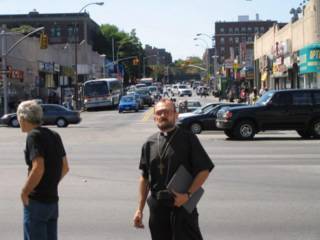







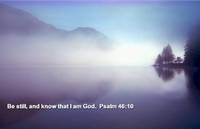




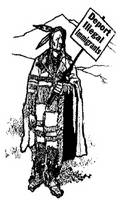
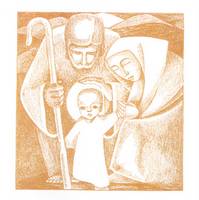


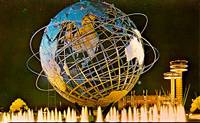
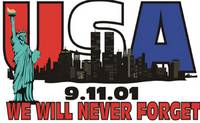































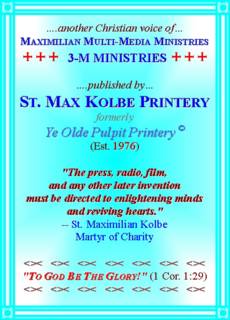




0 Comments:
Post a Comment
<< Home